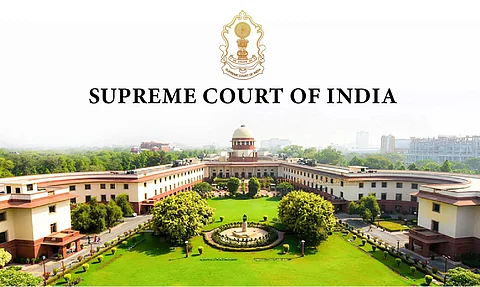
- Home
- Live Blog
- Breaking News
- Top Headlines
- Cities
- NE News
- Sentinel Media
- Sports
- Education
- Jobs

NEW DELHI: Solicitor General Tushar Mehta on Wednesday told the Supreme Court that the 2019 Ayodhya case judgment does not cover the questions connected with the validity of the Places of Worship (Special Provisions) Act, 1991. A bench headed by Chief Justice U.U. Lalit asked a specific question to Mehta, representing the Centre: "Is the 1991 Act covered by the Ayodhya judgment? What is your personal view?" To this, he replied it is not covered.
The top court was hearing a clutch of pleas against the certain provision of the 1991 law, which mandates maintaining character of religious places as prevailed on August 15, 1947.
During the hearing, senior advocate Rakesh Dwivedi, representing one of the petitioners, contended before the bench - also comprising Justices S. Ravindra Bhat and Ajay Rastogi - that the observations made by the apex court in the Ayodhya judgment was 'obiter dicta' as there was no advancing of arguments on the validity of 1991 law.
After Dwivedi made this submission, the Chief Justice queried Mehta regarding his personal view on the matter. Dwivedi said that the law was passed without debate and the matter involved questions of national importance and it must be decided by the court. Referring to the 11 questions framed by him, he added that the questions of law involve interpretation of the provisions of the Constitution and may be considered by the court in the present case.
The top court asked the Centre to bring on record its exact stand on petitions challenging the validity of certain provisions of the Places of Worship (Special Provisions) Act 1991, and how much time will it take to file a response in the matter. The bench asked Mehta: "What is the exact stand of the Central government... how much time, and when are you going to file (its response in the matter)..."
Citing the sensitivity in the matter, Mehta said the government would require two more weeks. Advocate Vrinda Grover, representing Jamiat Ulema-i-Hind, contended that Centre's response is important to take this matter forward. Mehta submitted that the reply was still under consideration. The bench noted that the Centre's response was relevant when the validity of a legislation was challenged.
After hearing arguments, the bench directed the Centre to file an affidavit on or before October 31. It listed the matter for further hearing on November 14.
Muslim organisations, namely Jamiat Ulama-I-Hind and All India Muslim Personal Law Board, have opposed the PILs challenging the validity of certain provisions of the Places of Worship (Special Provisions) Act, 1991.
On March 12, 2021, a bench headed by then Chief Justice S.A. Bobde had sought the Centre's response on the plea filed by advocate Ashwini Upadhyay challenging the validity of certain provisions of the 1991 law. In the meanwhile, a clutch of petitions has been filed in the apex court challenging the validity of certain provisions of the Places of Worship (Special Provisions) Act, 1991. (IANS)
Also Watch: